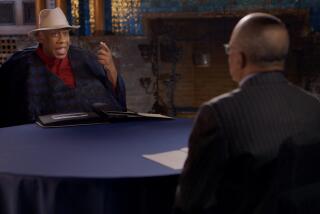TV REVIEWS : ‘Blackadder’ Back, ‘Third and Oak’ on A
- Share via
Two offerings on the Arts & Entertainment cable network tonight could hardly be more disparate: the sour British sitcom “Blackadder Goes Forth” at 8:30 and 12:30 a.m., and “Third and Oak: The Pool Hall,” a would-be heartwarming one-act play by Marsha Norman, starring James Earl Jones, at 6 and 10.
“Blackadder” is the fourth annual installment of the series to be seen on A&E.; Previous incarnations have covered the adventures of previous members of the Blackadder clan in the medieval, Elizabethan and Regency eras.
This one tosses Capt. Edmund Blackadder into the trenches of World War I and focuses on his schemes to get out. In tonight’s episode, he shamelessly tries to exploit a comrade’s artistic talents to talk his way off the front lines.
Most of the intended humor arises out of the ability of Rowan Atkinson, as Blackadder, to dryly deliver savagely sarcastic comments about his hapless situation and the dunderheads who surround him.
The show elicits a few helpless belly laughs, but it takes an initial period of adjustment to get to them. The loudness of the laugh track is disproportionate to the actual jokes. Parents of young children also should be aware that Blackadder speaks words that wouldn’t be heard on a commercial American network at the 8:30 hour.
“Third and Oak: The Pool Hall,” by Marsha Norman (of “ ‘night, Mother” and “Getting Out” fame), is the first of a new “American Playwrights Theatre” series. Three more will follow on the first Thursday of succeeding months.
James Earl Jones plays Willie, the proprietor of a foundering upstairs pool hall, and Mario Van Peebles portrays Shooter, the young sharpie whose late father was one of Willie’s best buddies. Shooter’s free-spending wife and her ailing father, another of Willie’s cohorts, are the subjects of much of the conversation between Willie and Shooter; unfortunately, both of them remain offstage.
The play suffers from its claustrophobic concentration on only two of its four main characters. Most of the talked-about action is strictly secondhand. Furthermore, the conversation is not fluidly written; mood changes seem sudden and insufficiently motivated.
The production isn’t the best, either. In one exchange early in the play, it sounds as if Van Peebles said a line prematurely, then repeated it--and director Fielder Cook didn’t have the time or money to go back and re-shoot. Other lines, from Jones as well as Van Peebles, are too muddy to understand. It’s a long hour.
Even the introduction, recited by Anthony Quinn, is wooden.
More to Read
The complete guide to home viewing
Get Screen Gab for everything about the TV shows and streaming movies everyone’s talking about.
You may occasionally receive promotional content from the Los Angeles Times.






